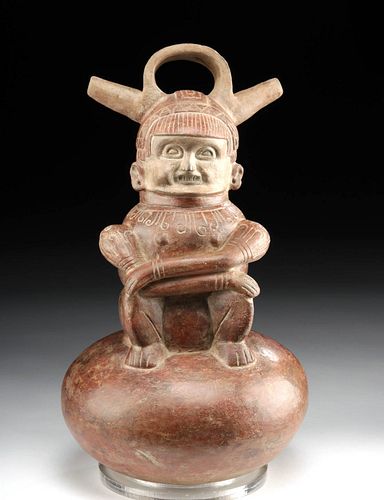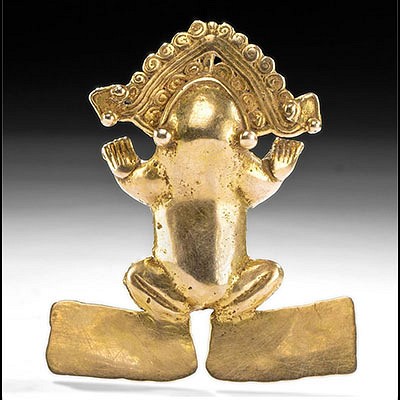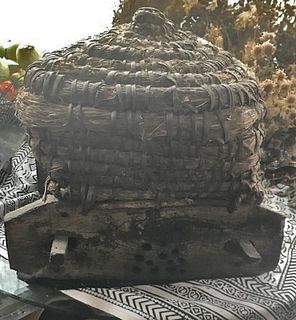Large Calima Pottery Seated Figure Vessel w/ TL
Lot 90a
About Seller
Artemis Gallery
686 S Taylor Ave, Ste 106
Louisville, CO 80027
United States
Selling antiquities, ancient and ethnographic art online since 1993, Artemis Gallery specializes in Classical Antiquities (Egyptian, Greek, Roman, Near Eastern), Asian, Pre-Columbian, African / Tribal / Oceanographic art. Our extensive inventory includes pottery, stone, metal, wood, glass and textil...Read more
Estimate:
$7,500 - $11,250
Absentee vs Live bid
Two ways to bid:
- Leave a max absentee bid and the platform will bid on your behalf up to your maximum bid during the live auction.
- Bid live during the auction and your bids will be submitted real-time to the auctioneer.
Bid Increments
| Price | Bid Increment |
|---|---|
| $0 | $25 |
| $300 | $50 |
| $1,000 | $100 |
| $2,000 | $250 |
| $5,000 | $500 |
| $10,000 | $1,000 |
| $20,000 | $2,500 |
| $50,000 | $5,000 |
| $100,000 | $10,000 |
| $200,000 | $20,000 |
About Auction
By Artemis Gallery
Aug 13, 2020
Set Reminder
2020-08-13 10:00:00
2020-08-13 10:00:00
America/New_York
Bidsquare
Bidsquare : Fine Antiquities, Ethnographic & Fine Art
https://www.bidsquare.com/auctions/artemis-gallery/fine-antiquities-ethnographic-fine-art-5415
Features classical antiquities, ancient and ethnographic art from cultures encompassing the globe. Egyptian, Greek, Roman, Etruscan, Near Eastern, Asian, Pre-Columbian, Native American, African / Tribal, Oceanic, Spanish Colonial, Russian, Fine Art, so much more! Artemis Gallery info@artemisgallery.com
Features classical antiquities, ancient and ethnographic art from cultures encompassing the globe. Egyptian, Greek, Roman, Etruscan, Near Eastern, Asian, Pre-Columbian, Native American, African / Tribal, Oceanic, Spanish Colonial, Russian, Fine Art, so much more! Artemis Gallery info@artemisgallery.com
- Lot Description
Pre-Columbian, Colombia, Calima people, Transitional Llama Phase-Yotoco Phase, ca. 100 BCE to 800 CE. A fantastically well-preserved pottery vessel known as an alcarazza with a smooth burnished surface, a woman richly adorned and seated in a crouch atop a wide, round, apple-shaped vessel. Protruding from the woman's head is a double spout with a curved, half-circle strap handle between them. Her arms and chest are incised with curlique motifs that to the modern eye resemble musical notes but that may signify rising crops. Rigidly combed, straight hair covers the forehead, while a decorative cap with incised triangles and labyrinthine forms covers the rest of the head. The woman's face is sunken, with deeply set, large eyes, a tiny, pointed nose, and a small mouth with gritted teeth between two chubby cheeks. Pierced earlobes indicate that the vessel may have once had gold rings or some other decoration. Size: 6.25" W x 11.75" H (15.9 cm x 29.8 cm)
The Calima people lived in the southwestern highlands by the Caribbean coast, and are famous for their goldwork, but they also produced charming pottery figures like this one. This is a type of pottery known as Ilama, which dates to the Formative period for the Calima, characterized by brushed and incised decoration with some incisions filled in with white paste.
This piece has been tested using thermoluminescence (TL) analysis and has been found to be ancient and of the period stated. A full report will accompany purchase.
Provenance: private Arcadia, California, USA collection, acquired at William Siegel Gallery, Santa Fe, New Mexico, USA, prior to 2004
All items legal to buy/sell under U.S. Statute covering cultural patrimony Code 2600, CHAPTER 14, and are guaranteed to be as described or your money back.
A Certificate of Authenticity will accompany all winning bids.
We ship worldwide and handle all shipping in-house for your convenience.
#150324Stand in photograph is not included. Expertly repaired and restored with approximately 85% original material. TL drill hole on underside. Small chips, nicks, and scratches commensurate with age.Condition
- Shipping Info
-
All shipping is handled in-house for your convenience. Your invoice from Artemis Gallery will include shipping calculation instructions. If in doubt, please inquire BEFORE bidding for estimated shipping costs for individual items.
-
- Buyer's Premium



 EUR
EUR CAD
CAD AUD
AUD GBP
GBP MXN
MXN HKD
HKD CNY
CNY MYR
MYR SEK
SEK SGD
SGD CHF
CHF THB
THB
















